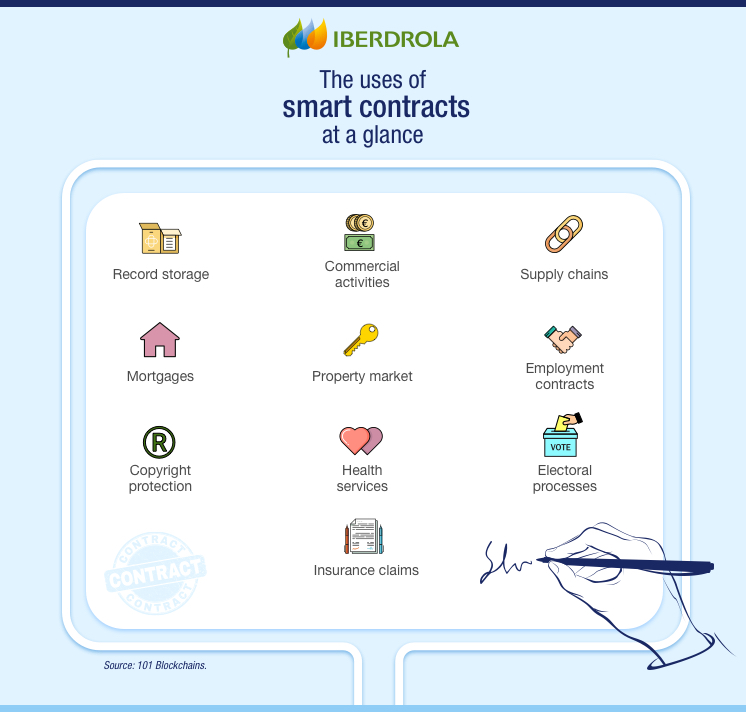Smart Contracts
Smart contracts: contracts to formalise agreements in the digital age
Business Digital talent Internet
The smart contract is written in virtual language and has the power to execute and enforce itself, autonomously and automatically, based on a series of programmed parameters. With blockchain technology, its main value lies in reinforcing security, transparency and trust between signatories, avoiding misunderstandings, falsifications or alterations and dispensing with intermediaries.

When we buy a house we have to sign a sales contract with the seller, but this is not a simple process: we need a bank, a notary, a land registry and a lot of paperwork. Smart contracts, which have emerged from blockchain, technology, promise to simplify this type of process as much as possible.
WHAT IS A SMART CONTRACT
A smart contract is an agreement between two people or entities in the form of computer code programmed to execute automatically. The idea was proposed in the 1990s by Nick Szabo, a pioneer of modern computer science, who defined them as a set of virtual promises with associated protocols to enforce them. The Bitcoin protocol, which basically records the proof of a payment, can be seen as a primitive version of a smart contract.
Smart contracts are executed on blockchain, which means that the terms are stored in a distributed database and cannot be changed. Transactions are also processed on the blockchain, which automates payments and counterparties. Since the emergence of the digital currency Ethereum, the creation and execution of smart contracts has been simplified, as complex transactions can be programmed into the Ethereum protocol.
HOW DOES A SMART CONTRACT WORK
The operation of a smart contract is similar to other blockchain transfers. These are the necessary steps:
1. A user initiates a transaction from their blockchain wallet.
2. The transaction arrives at the distributed database, where the identity is confirmed.
3. The transaction, which may be a transfer of funds, is approved.
4. The transaction includes the code that defines what type of transaction is to be executed.
5. The transactions are added as a block within the blockchain.
6. Any change in contract status follows the same process to be updated.
SMART CONTRACTS PLATFORMS
Below, we review some of the most widely used platforms to develop and execute smart contracts on blockchain:
- Ethereum: smart contracts are written in a programming language called Solidity and executed by the Ethereum virtual machine. It is currently the most popular.
- Hyperledger: an open source system developed by the Linux Foundation that is not a cryptocurrency, but a flexible platform on which smart contracts can be developed.
- Counterparty: this platform incorporates data into Bitcoin transactions, i.e. it uses the cryptocurrency's blockchain and allows contracts to be developed on it.
- Polkadot: it is an alternative to blockchain and is famous for its ability to host parachains, chains within chains, allowing more transactions than usual.
SMART CONTRACT APPLICATIONS (EXAMPLES)
Smart contracts have applications in all areas where traditional contracts are currently signed:
Records
Smart contracts will facilitate the storage and maintenance of records. For example, the millions of confidential patient records that need to be securely stored and updated.
Trade
Most commercial activities depend on the approval of their funding, which is a time-consuming and resource-intensive process. Thanks to smart contracts, this time can be dramatically reduced.
Supply chains
Internet of Things devices can be used throughout the supply chain to record every step of a product and improve its traceability. In this way, errors, theft and loss can be eliminated.
Mortgages
Mortgage transactions based on smart contracts will be cheaper, faster and safer. This will allow buyers to access the property earlier and update the records automatically.
Property market
Smart contracts can be used to register property ownership more efficiently. Moreover, their use can extend beyond flats, buildings or land and register all types of assets.

SEE INFOGRAPHIC: Uses of smart contracts at a glance [PDF]
Human Resources
The use of smart contracts that record a person's academic qualifications, certificates and experience can prevent fraud in CVs and therefore facilitate the recruitment of individuals, also companies, providing a service.
Intellectual property
Many companies are dragged into years of court disputes over the use of patents in project development. Smart contracts can keep track of which part belongs to which company.
Health
In addition to the recording of health data mentioned above, its application in this sector can range from the traceability of medicines to the management of the cold chain, the health passport or clinical research.
Elections
Electoral fraud is a real risk in some countries and has been used as a political weapon to destabilise others. Smart contracts make it possible to validate a voter's identity and reliably record their vote.
Insurance
The industry spends millions each year on claims processing and claims handling. Smart contracts will allow payment amounts to be determined automatically based on the type of policy.
BENEFITS OF A SMART CONTRACT
Smart contracts offer a number of benefits to the parties involved:
- Independence: the participants make the arrangements themselves, i.e. the involvement of intermediaries can be dispensed with.
- Reliability: the contract is securely stored in a distributed network and is virtually impossible to alter or forge.
- Security: being in a distributed network, the contract is duplicated in all nodes of the network and cannot be lost.
- Savings: by cutting out intermediaries and commissions, there is a reduction in costs for all parties involved.
- Accuracy: this type of contract reduces to zero the possibility of errors in the terms or processing.
- Sustainability: contracts eliminate the use of paper in offices, notaries and registers, and pollution is reduced as a result of less travel.




